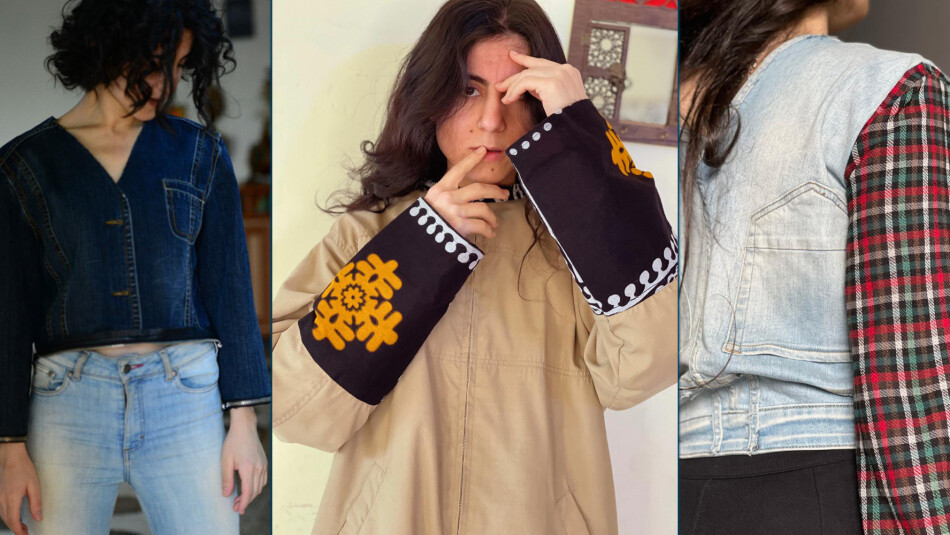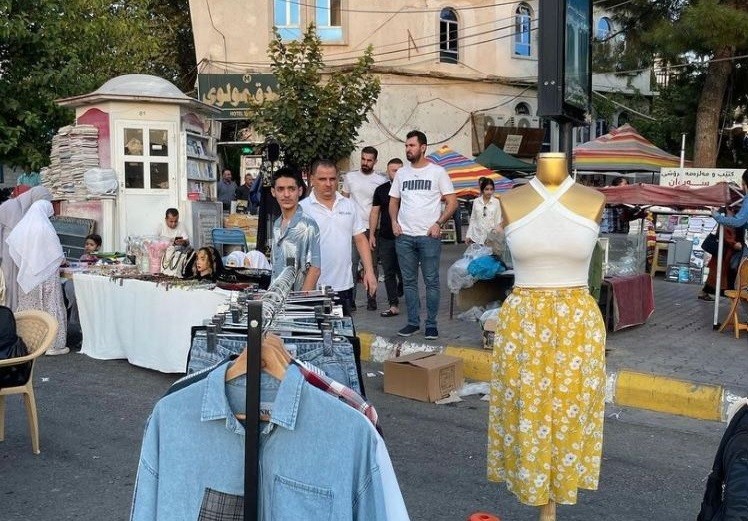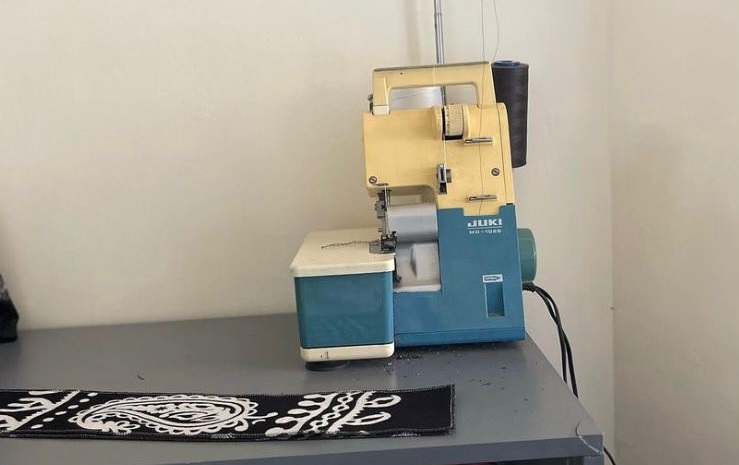
Used clothes are no longer thrown away and pollute the environment. Jawana Bakr creates new styles with used clothes and pieces of fabric, both reproducing the old fabric, preventing environmental pollution and a source of livelihood for herself.
Bakr, 29, a teacher and designer in Sulaimaniya northern province, has launched a project to reproduce second hand clothes that can still be reused in new designs.
“I want to protect the environment because clothes emit methanol when they are thrown away and decompose in the landfill, a powerful gas that contributes to global warming and climate change.”
“I redesign them in different styles, shapes and sizes, sometimes even mixing and changing other pieces at the request of my customers,” she says.
Jwana reproduces new fashion with second hand clothes
Buyers are usually people who take used clothes themselves, redesigned by Bakr for them in return for a fee and reuse them. She also takes old clothes from people and reproduces new clothes and displays them for sale.
Clothing waste is largely influenced by the fast fashion sector in Iraq, with some people buying more clothes than they need and throwing them away after a short time of use.
For example, Heshu Rafiq, a female student at Sulaimani University, says, “I don't spend a lot of money on clothes. I buy nice pieces for a cheap price, use them couple of times and throw them away.”
This increases the amount of clothing discarded, although there are no statistics in Iraq.
Cheap, low-quality clothing deteriorates quickly, resulting in more waste.

The garment industry, globally, produce 92 million tons of waste annually, whether during production, or discarded old clothing waste, is expected to reach 102 million tons by 2030.
Clothing or fashion waste includes all discarded clothing, textiles and cosmetic items that remain during production and use.
Jawana says that along with her passion for design and the income of her work, she has also thought about protecting the environment.
Jawana showcases her products through her Instagram account and has introduced herself as the first Kurdish brand to recycle clothes. She has over 5,000 followers.
“People or friends and people around me don't throw away the clothes they don't use now. They bring them to me to use them again after they are happy with my brand,” she says.
People or friends and people around me bring me clothes they don’t use now they don’t throw them away
“I do all my work myself, but other people come into my work according to the type of projects I have, such as models or photographers.”
In general, people, especially young people, have welcomed the initiative. “I want the message to be clear that the main goal of my work is not to pollute the environment with used clothes,” she said.
The designer sells her clothes online and offers home delivery.

“I saw her work on Insta page and found it very interesting. She has started her own business and has been able to serve the environment,” said Shewa Mohammed, a buyer of New Conic products.
Earlier this year, Jawana participated in the Sulaimani Fashion Week and showcased her products.
“The effort and thought she spent on her work was evident. An old and torn hood had been renovated in detail. The important thing is that this piece is not thrown away and does not pollute the environment,” Mohammed added.
She mixes some pieces of Kurdish fabric with modern pieces, which has made her clothes attractive and unique.
Bags and tote bags are another part of her beautiful work, in which she also reuses used fabrics.
“Resorting to making bags and tote bags is to keep people away from plastic bags, which are reused for the first time and cause environmental pollution,” Jawana said.
Aso Shikak, an environmental activist and head of Aviary Environmental Awareness Organization, says that different types of fabrics decompose in the soil according to standards, “but in the end they become waste and harm the environment and climate, especially those containing nylon because they take time to decompose.”
"The lack of reuse of fabrics and clothes and the abundance of buying and throwing them away has caused a lot of garment waste," he said.
Lack of reuse of fabrics and garments and frequent purchases and disposal have led to a lot of garment waste
Shikak suggests for people to donate the clothes they don't use to others or recycle them in a recycling project.
He believes that throwing clothes, especially near water sources, pollutes the water and damages trees and animals.
Jawana's problem is that she has not yet been able to scale her project to fully reflect the impact of her work on the environment. She is now working at her own home and needs space and staff to do so.
"People have little understanding to prevent environmental pollution that affects climate change," he said.
According to the United Nations, Iraq is the fifth most affected country by climate change.
"Every year, the highest temperatures are recorded in Iraq, this year the highest in Khanaqin district in Diyala province," outgoing Iraqi Environment Minister Nizar Amedi said at the Climate Change Summit (COP28) in Dubai, UAE last year.
“It is clear that Iraq is very affected by climate change.”
Iraq's environmental situation is very bad
As a teacher, Bakr enlightens her students about climate change and protection of environment.
“I tell them that if they don't help reduce climate change, don't increase it. I want to teach them to be environmentally friendly in their daily lives.”
She also considers it important for the education sector to introduce environmental and climate change and its damage to the students.
“The situation in Iraq is very bad in all environmental aspects, in terms of water and air pollution, in terms of desertification of agricultural land. we have lost a lot of agricultural land. Iraq has not paid attention to the environment in the past,” former Iraqi minister of environment said.
Jawana said she has not been able to devote herself fully to her project, which she relies on as a second job.
She called for more fashion festivals to sell her products and spread awareness and convey her greater message to the public.
“My participation in Sulaimani Fashion 2024 by mixing denim with other fabrics was well received and was a good income. My works went viral and demands went up as they bring their own stuff to be redesigned.”